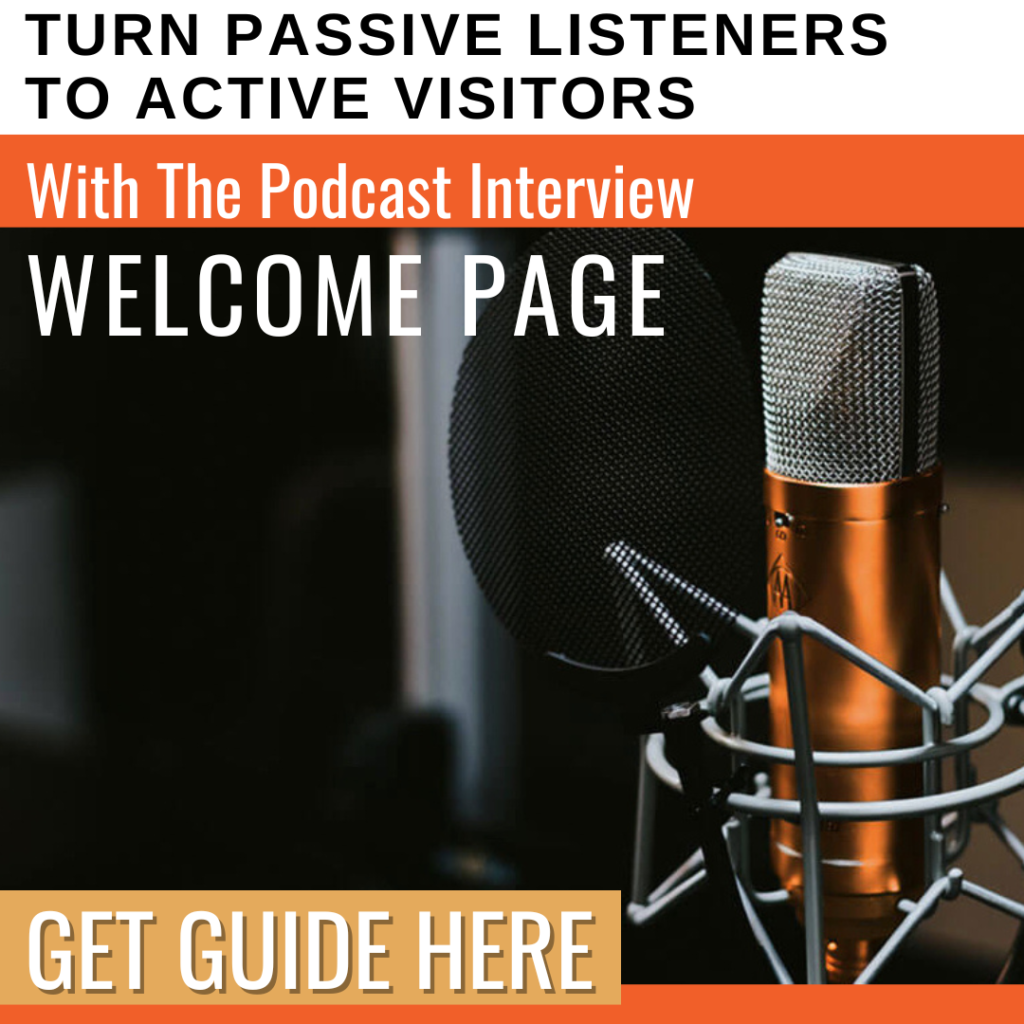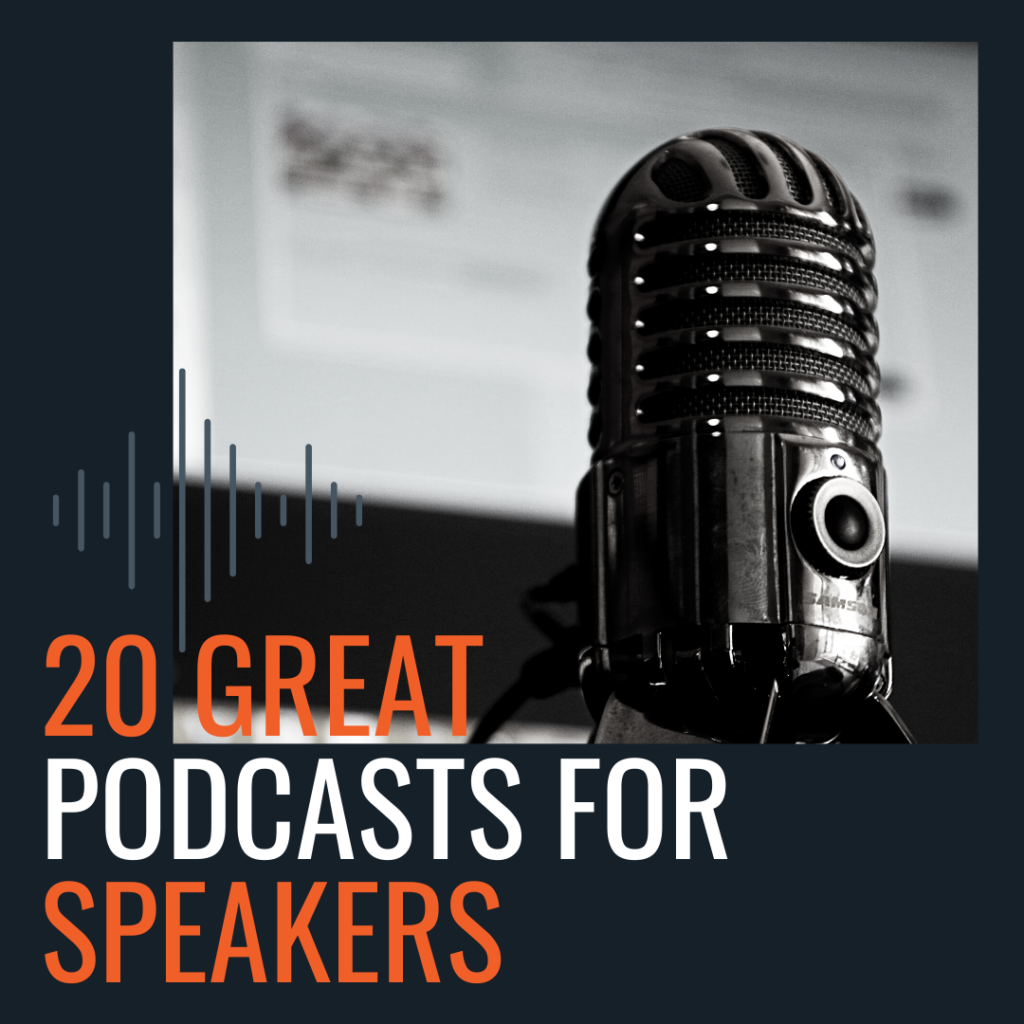
Once a podcast is recorded, it is out in the world forever.
Podcasts are one of the best ways to interact with potential clients—without actually having to interact with anyone every day—because it captures your personality and makes it accessible to anyone.
Once you record a podcast, it can be listened to indefinitely, meaning in one day, in three months, or in five years, people will still be able to listen to your podcast and take action on it.
The word forever can be a little nerve wracking at first, especially when preparing for your first, or maybe even 100th, guest appearance. But forever is what makes podcast guesting so valuable.
Before you pull your chair up to the table and speak into the mic, prepare with these nine common questions. These questions are guaranteed to not only knock your listeners socks off but also make the hour of your time incredibly valuable—for you and your business.
9 Common Podcast Interview Questions—And How to Nail Them
1| Tell Us About Yourself
Many inexperienced podcasters will start off the show with this simple question, and if you haven’t prepped ahead of time, your mind may start racing through every single thing you have ever done in your life. Your opening to a podcast either allows you to tee up a home run answer or fall flat on your face in the first 60 seconds. The truth is, no one really wants to hear about you. What the listeners really want to hear an answer to is, why should I listen to this?
They want to know what insights and value you are bringing to the table. Everything you share should focus on the topic of the episode. You don’t need to mention your parakeet Bob or the vegetable farm in your backyard—unless it is a farming podcast. Keep it relevant. You want to only talk about how your experience is relevant to what is going to be discussed here today. Spoiler alert: no one cares what you majored in.
Great ways to start this question is with a strong statement.
Try using this formula to guide you:
I believe _____. [Let them know your point of view, how you’re different.]
Because ________. [What gives you the authority—expertise, training—to believe what you do?]
I know that_____________ can also do it. [Describe the listener and your ideal customer here.]
This focuses on the listeners. And notice how you don’t have to mention the adorable kittens you have or your high school teacher Mrs. Thomas. This question is easy to overthink, but it’s always done best when you keep it simple. Talk about how you are relevant to the present conversation.
2| What is the one (to three) things you want people to take away today?
This question is your golden opportunity to reiterate the main thing you want listeners to know. And remember, always make it relevant to the listener.
Try something like this:
If you are _______ [Help them self-identify; describe the person you are mainly talking to today.]
Who struggle with ___________ [Restate the problem. What are the people who you are helping today struggling with the most?]
You can __________ [Give them hope. What can they do? What will they be able to do after listening to this podcast interview?]
3| How can people get in touch with you?
Guests lose listeners on this question all the time. First, imagine your listener. About 60% of listeners are listening to you on their way to work, or maybe they are driving, cooking, or working out. None of these people have a pen to jot anything down. Everything they hear is going to have to be remembered. Also, about 70% of listeners have you sped up. This question is not an invitation to give them your email, phone, IG, FB, LinkedIn, and Twitter.
Give them one place to go. Make it easy.
The best practice is to send them to your website (don’t send them to your book on Amazon and your Facebook page; those sites get enough traffic already) and let them know all of your contact information is there.
Say the address, say it slow (remember, they are listening to it sped up), then repeat it again.
4| Where should people go to get more information?
Again, remember your listener is likely multitasking. Make it easy for them. Give them a place to get more information and what they can expect to get from that site. The simpler the URL, the better.
Unfortunately, “Sign up for my newsletter.” doesn’t work today like it once did. I mean, how many newsletters are you signed up for?
Of course, sending them to your website is great, but it isn’t personalized to them and the place they found you—that specific podcast interview. You need to create a bridge between your new listener from the interview and your website. Your website is too broad. The site you send them to needs to make sense for them and be concise. From our testing over the last eight years with 1,000+ clients and 50,000 interviews, the best thing to do is to meet them where they are.
If this podcast contains an audience that would be a little interested, offer something to get them back to the site. For example, you could offer an image, a checklist, or an assessment. This is a quick win and doesn’t require much time or money from you.
If you believe the listeners are a bit more invested and interested, use books, videos, or a low-level course to drive people back to your site. This requires a bit more time and money on the listener’s part.
What if you know the audience is a “Heck yes!” These are the listeners that are ready with credit card in hand. If they are to that level, you don’t want to offer a free report or a copy of your book. This slows them down. Offer them your Big Yes offer, like a free consultation call.
If you can offer one of these things for each person, you are giving everyone a reason to head to your website. But again, keep it simple.
5| What is your favorite (most influential) book?
This question isn’t an opportunity to talk about that one Stephen King novel you read over your vacation—again, unless that is relevant to the show and audience you are speaking to. The answer to this question should demonstrate your expertise in your field. You are aiming to position yourself as an expert, and audiences are curious what their industry leaders are reading or a book that held the biggest impact for them.
Make your response interesting. Tie a story in about the first time you read the book and the impact it had on your life. Mention the author. Giving credit to the originator of an idea does not take authority away from you but rather shows you are open to learning and your continued growth. Plagiarism is rampant online, and those who are educated will recognize it and lose all respect for you when you use it.
Make sure the book and lesson you tie in are what is being focused on in this interview. That’s the key.
If you are a person of faith, I commend you, but answers like “My favorite book is the Bible, the Torah, or the Koran.” seem trite and don’t demonstrate expertise for this type of setting. Be proud of your faith. You don’t need to hide it. If you want to promote your faith, consider mentioning a book that has a commentary on the Holy Word. Site the author and what specifically you learned from it that illuminated your experience. The goal here is to keep it relevant to the show, audience and topic.
6| Which person has been most influential in your life?
Your answer should support the topic at hand on the podcast. Share about the person who first introduced you to the topic you are discussing—a powerful leader or author, or even an early client/customer who helped you refine what you are talking about today. Sure, Marty McLaughlin saved your life pulling you out of a lake when you were 13, but where is the relevance building your brand and building your business? It’s a tangent that distracts the audience and confuses them about your focus and expertise.
Variations of this question often include, If you could have dinner with one person, dead or alive, whom would it be? These are always fun questions that allows your personality to shine through and let your listeners get to know you, but they are still an opportunity for you to give a focused answer.
7| Best piece of advice you’ve ever gotten
Much like the best book or most important person, make sure your answer applies to the topic you are there to discuss. An interesting flip is rephrasing it to be the worst advice you got. Oftentimes our biggest “ah-ha” teaching moments in life are when we see examples of what not to do. Reiterate what the majority think, how you disagree, and how you came to that conclusion: “Everyone told me to do it this way . . .. You may have been told this lie as well. This lie hurt my growth and slowed me down until I discovered it should really be done this way . . ..”
This is an interesting spin on this question. It grabs the listener’s attention. Remember, they are likely multitasking. Plus, it also allows you to speak directly to people who may have the exact same problem you overcame and shows you can help them too.
8| Thank You
You may be thinking, “But ‘Thank you’ isn’t a question?” You’re right, but while it is not a question, it can be an invitation for one last word. Don’t miss this opportunity by replying “Thank you for having me.” or “Thanks, I had a really good time.” Remember this podcast is not about you.
Instead, try this three part Thank You
Thank the host.
Acknowledge the work they do.
Encourage listeners to take action.
Here’s an example:
Thank you, Doug.
I really appreciate all you do here on the Nice Guys Podcast.
If any of this resonated with you, I’d encourage you to take action.
Take action, meaning direct them back to the site you invited them to visit earlier. This reminds them of the URL you mentioned earlier and ties the conversation up by bringing it full circle.
9| What can I do for you?
After the recording ends, there is typically some small talk with the host. This is your opportunity to ask them candid questions “off the air.”
But most importantly, there is one question you should always include: “What can I do for you?”
Remember, being a guest is about building a relationship. Often times, if a show goes well, you will get a return invite, so you want to show you appreciate the host’s time and are courteous. Then, be prepared with concrete actions when they politely ask the question back. Responding with “I’m good. I just appreciate the interview.” is insulting. This response can sometimes be taken that you don’t feel the host can provide any further value to you.
Here are some suggestions of what you can ask of the host:
- If you know any podcast hosts whom I could be of value to, I’d appreciate an introduction.
- Can you let me know when it goes live so I can promote it?
- Can you give me some feedback on how I could improve as a guest?
- Can we get a quick picture here? I’d like to share it on my social media.
- Can I get a copy of the recording so I can start repurposing it to promote it when it goes live?
- Can I get your mailing address? I’d like to send you a thank you gift.
- Can I buy you a drink or coffee next time you are in my city or I’m in yours?
The ask doesn’t have to be big. A lot of times people feel bad asking something from someone, but this question is key because it fosters a relationship with the host outside of the interview. Remember, at the end of the day, the relationships you are able to build with the listeners and the host will provide the biggest return on investment. If you have your listeners and host in mind, then you’re on the right track.
Looking For More?
Read more about podcast interview marketing with these resources.


